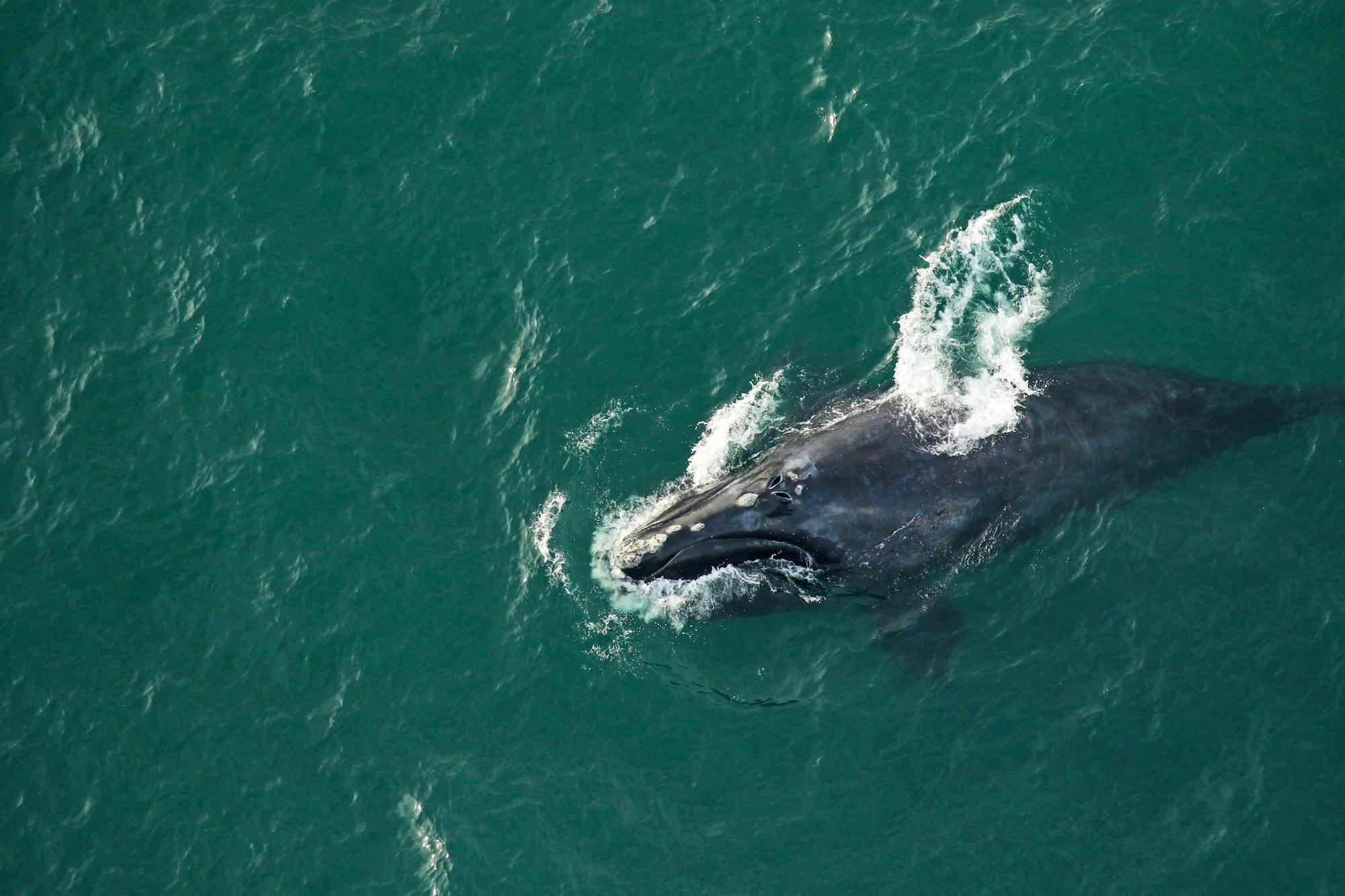Conservation groups this week asked a federal judge to set a Nov. 1 deadline for long-delayed federal action to finalize expanded vessel strike protections for critically endangered North Atlantic right whales. Calving season is only months away and right whale mothers and calves will suffer the most if new speed limit protections are not in effect.
Defenders of Wildlife, the Center for Biological Diversity, Whale and Dolphin Conservation and the Conservation Law Foundation filed the request in a 2021 case challenging the government’s unreasonable delay in updating a 2008 vessel speed rule that sets seasonal speed limits for vessels 65 feet and longer in zones along the East Coast. Conservation groups also challenge unreasonable governmental delay in acting on a 2022 proposal to update the rule. Groups have petitioned to expand the rule to include smaller vessels and additional areas since 2012 — a call that went unanswered until they filed suit.
The right whale is approaching extinction, with only around 360 animals surviving today, including around 70 reproductively active females. Vessel strikes are a leading cause of death and injury for the species, with mother-calf pairs and juveniles at disproportionate risk. Seven mortalities and serious (i.e., likely lethal) injuries from vessel strikes have been documented since conservation groups filed suit, all during the species’ November-April calving season.
“The right whale has no more time to wait for National Marine Fisheries Service foot-dragging” said Jane Davenport, senior attorney with Defenders of Wildlife. “We are watching this species’ extinction unfold in real time on this administration’s watch. We’re asking the court to enforce the law because the Service clearly isn’t up to the task.”
The updated rule would establish new seasonal speed zones in times and places right whales are most at risk of vessel strikes, based on extensive data on the overlap of right whales and vessel traffic in U.S. waters. In these zones, vessels 35 feet and longer would be held to a mandatory speed limit of 10 nautical miles per hour. Temporary dynamic speed zones would be triggered by visual or acoustic right whale detections. The updated rule would contain safety exemptions that would not require any regulated vessel to slow down if doing so would put human health or lives at risk or interfere with navigational safety.
Speed limits are the only known way to minimize lethal collisions between large whales and vessels. Although future technologies may be developed to enhance right whale detection, reduce collision risk, and improve safety for both mariners and right whales, no such technologies exist now.
“North Atlantic right whales are hovering on the brink of extinction, and the last thing they need is more delay in reducing vessel speeds in some of their most important habitat,” said Kristen Monsell, oceans legal director at the Center for Biological Diversity. “It’s been abundantly clear for a long time that slowing vessels down saves whales, so it’s frustrating that the Fisheries Service has dragged its feet on such a straightforward solution. It’s time to get this done before it’s too late.”
“We have lost 2% of the right whale population just this year, and the most tragic aspect of that statistic is that these losses were preventable. Pilgrim’s 2023 calf was only a year old when a vessel struck and killed her, fracturing her skull. She didn’t even live long enough to get a name, never mind have a family of her own. Right whale #1950 was hit so hard that her back was blown open and her spine was fractured. Her newborn calf can’t survive without her so that’s a double loss from a vessel strike,” said Regina Asmutis-Silvia, WDC-NA executive director. “It’s becoming a tragic joke: How many dead whales does it take to get a regulation in place? At the rate we are losing right whales, the punchline is all of them, and that is not acceptable.”
“There is nothing reasonable about waiting 4 years to protect a species that faces extinction from getting maimed and killed by boats,” said Erica Fuller, senior counsel at the Conservation Law Foundation. “This delay jeopardizes not just right whales, but every other ongoing effort to recover the species. The administration must issue a final rule before this next calving season begins.”
The lawsuit is titled Whale and Dolphin Conservation v. National Marine Fisheries Service, Civ. No. 1:21-cv-112, and is in federal district court for the District of Columbia. The current litigation briefing schedule runs through Sept. 12.
For over 75 years, Defenders of Wildlife has remained dedicated to protecting all native animals and plants in their natural communities. With a nationwide network of nearly 2.1 million members and supporters, Defenders of Wildlife is a leading advocate for innovative solutions to safeguard our wildlife for generations to come. To learn more, please visit https://defenders.org/newsroom or follow us on X @Defenders.
News

Defenders Receives Advocacy Organization of the Year Award





